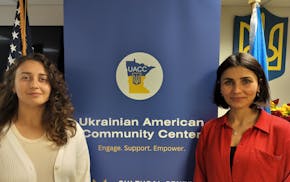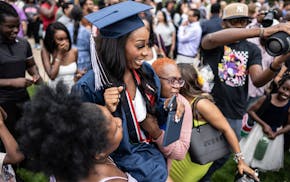Opinion editor's note: Strib Voices publishes a mix of commentary online and in print each day. To contribute, click here.
•••
"Veritas" — Latin for "verity" or "truth" — is Harvard's motto. So here's the truth about Harvard and nearly every campus in this country: International students are needed not just for higher education but for the higher standard of living and higher ideals their schools deliver to America.
Harvard is at the crux of this crucial truth because the Trump administration is trying to revoke its ability to enroll international students. This unprecedented, unproductive move is part of a broader assault on the university that includes demands on issues ranging from governance, hiring, admissions, viewpoint diversity, DEI programs, student discipline and allegations of antisemitism related to campus protests over the war in Gaza, among other issues.
Bucking the buckling that occurred at some other targeted institutions, Harvard, citing academic freedom among other enduring American values and statutes, has rightfully resisted, resulting in the administration announcing cuts of billions in federal funding, including research grants involving the National Institutes of Health and Centers for Disease Control and Prevention. In addition, President Donald Trump has threatened the school's tax-exempt status.
"It's what they deserve!" Trump posted on social media.
It's not what the nation deserves.
In fact, the opposite: American higher education is world class and an extraordinarily successful export at a time when trade deficits are also a presidential obsession. As reported by the Washington Post's Catherine Rampell, the U.S. Bureau of Economic Analysis reports that "in dollar terms, last year, the United States sold more educational services to the rest of the world than it sold in natural gas and coal combined."
The continuing, punishing assault is not what students deserve. International ones, to be sure. Especially since most go to extraordinary (and expensive) lengths to come study in America. But also, American ones, who benefit greatly from the global perspectives such students bring.
"For our Minnesota students, to have the opportunity to be friends with and learn from folks from around the world is itself a huge part of the learning experience of college life," said Minnesota State Chancellor Scott Olson. "Having international students on our campuses is a huge benefit that helps our Minnesota students understand the world just a little bit better."
Of course, the international inverse is also true.
"A flip side of that same thing is having international students come here to Minnesota and be part of our campuses and learn what it's like to be a Minnesotan," said Olson, who added that, "When they go back home around the world they really become ambassadors for our Minnesota way of life, or the American way of life, and help the world understand us a little bit better."
Overall, Olson said, out of a total of about 270,000 students last semester there were 4,691 international students at 32 Minnesota State colleges and universities spread throughout the state, ranging from 41 at Lake Superior College to 1,347 at Minnesota State, Mankato. If the Harvard ban spread nationwide, or the halt in new interviews for student and exchange visas announced yesterday by Secretary of State Marco Rubio runs on indefinitely, it would definitely impact these numbers and maybe even reverse the enrollment momentum Minnesota State has recently realized.
The effect could also be profound for some of Minnesota's private colleges, which in fall 2023 had 3,178 international students, including 321, or 15% of total students, at Macalester last year. These scholars, Macalester President Suzanne M. Rivera said in a statement, "bring different perspectives, points of view, faith traditions, and lived experiences that enrich classroom learning and campus life. We are heartbroken about the fear and anxiety these recent policy shifts at the federal level are causing our international students, and we hope additional barriers will not be erected to discourage future students from continuing their education in the U.S."
The impact could also be acute at the University of Minnesota, which last year enrolled 5,712 international students from more than 140 countries on its five campuses, including 5,410 in the Twin Cities. Like many institutions across the U.S., international students often pay the highest tuition and are a core component of the business model.
But just as with Minnesota State campuses, it's a more intrinsic value that may be lost, said Raj Singh, vice provost and dean of undergraduate education at the U.
International students "enrich our community and bring really unique perspectives and experiences," said Singh. "What is less well understood is the benefit that our students and our campuses get from their presence here."
Even if a Harvard-like ban doesn't take hold, the administration's aggression toward the elite institution can have a chilling effect. "This country," said Singh, "has been a beacon of hope for many of these international students, and if they lose this concept that we are a welcoming society, that we give people opportunities, students will have a lot of choices [from] other countries."
And it may not be just international students who choose other countries. American students, particularly at the postgraduate level, may look elsewhere too, a specter reflected in an influential Foreign Affairs article titled "America's Coming Brain Drain: Trump's War on Universities Could Kill U.S. Innovation."
Its author, MIT President Emeritus L. Rafael Reif, summed up the situation: "To avert scientific and technological stagnation, the United States must significantly increase public investments in university-based research, ensure that it capitalizes on discoveries that emerge from academia, and devise sensible immigration policies that allow the world's best students to study and then work in the United States. Right now, however, the administration seems hell-bent on damaging, rather than fostering, this crucial source of American strength."
"Veritas" appears on the Harvard shield logo spelled out across three books. The books are open. Just like Harvard and every American higher-education institution should be to individuals and ideas from around the world.
Rash: Unite on the right to, and rights of, a free press

Rash: 'Between both worlds,' Ukrainians in Minnesota contribute to each

